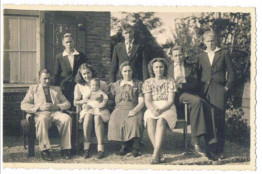
The Hague: In 1943, Henk Zanoli took a dangerous train trip, slipping past Nazi guards and checkpoints to smuggle a Jewish boy from Amsterdam to the Dutch village of Eemnes.
There, the Zanoli family, already under suspicion for resisting the Nazi occupation, hid the boy in their home for two years. The boy would be the only member of his family to survive the Holocaust.
Seventy-one years later, on July 20, an Israeli airstrike flattened a house in the Gaza Strip, killing six of Zanoli’s relatives by marriage. His grandniece, a Dutch diplomat, is married to a Palestinian economist, Esmail Ziadah, who lost three brothers, a sister-in-law, a nephew and his father’s first wife in the attack.
On Thursday, Zanoli, 91, whose father died in a Nazi camp, went to the Israeli Embassy in The Hague and returned a medal he received honouring him as one of the Righteous Among the Nations — non-Jews honoured by Israel for saving Jews during the Holocaust.
Terrible price to pay
In an anguished letter to the Israeli ambassador to the Netherlands, he described the terrible price his family had paid for opposing Nazi tyranny.
“My sister lost her husband, who was executed in the dunes of The Hague for his involvement in the resistance,” he wrote. “My brother lost his Jewish fiancee who was deported, never to return.”
Zanoli continued, “Against this background, it is particularly shocking and tragic that today, four generations on, our family is faced with the murder of our kin in Gaza. Murder carried out by the State of Israel.”
His act crystallises the moral debate over Israel’s military air and ground assault in the Gaza Strip, in which about 2,000 people, a majority of them civilians, have been killed. Israel says the strikes are aimed at Hamas fighters who fire rockets at Israeli cities and have dug a secret network of tunnels into Israel.
Zanoli transformed over the decades from a champion to a critic of the Israeli state, mirroring a larger shift in Europe, where anguish over the slaughter of six million European Jews led many to support the founding of Israel in 1948 as a haven for Jews worldwide.
But in the years since Israel occupied the West Bank and Gaza during the 1967 war, Europeans have become more critical. Israel blames anti-Semitism, which has grown in Europe with the rise of right-wing politicians.
Some European protests against Israeli military action have been marred in recent weeks by open anti-Semitism, blurring the line between criticism of Israeli policy and hate speech against Jews. But many other critics, like Zanoli, say their objection to Israeli policy is not anti-Jewish but consistent with the humanitarian principles that led them to condemn the Holocaust and support the founding of a Jewish state.
‘Not against Israeli people’
“I gave back my medal because I didn’t agree with what the state of Israel is doing to my family and to the Palestinians on the whole,” Zanoli said in an interview on Friday in his spare but elegant apartment, adding that his decision was a statement “only against the state of Israel, not the Israeli people.”
“Jews were our friends,” said Zanoli, a retired lawyer who uses a motorised scooter but remains erect and regal, much as he appears in a yellowing 1940s photograph archived at the Yad Vashem Holocaust memorial in Occupied Jerusalem. Zanoli said he had never publicly criticised Israel “until I heard that my family was the victim.”
In Gaza, Zanoli’s in-laws say his gesture is a fitting response to the losses of their family and others who have lost multiple relatives in strikes on homes.
Those in-laws include Hassan Al Zeyada, a psychological trauma counsellor who is an older brother of Esmail Ziadah. Their mother, Muftiyah, 70, was the oldest family member to die in the bombing.
Like Zanoli, Dr Zeyada, 50, who works to treat the many Palestinians in Gaza traumatised by war and displacement, has given much thought to the fact that Israel was founded after the Holocaust.
Zeyada, who transliterates his family name differently from his brother, said on Friday that he admired Zanoli and his family for their struggle in World War II against “discrimination and oppression in general and against the Jews in particular.”
“For them,” he added, “it’s something painful that the people you defended and struggled for turn into aggressors.”












